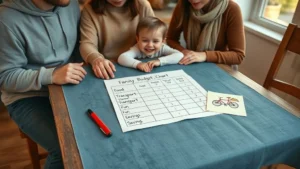Why Skip the Budget Chaos?
Okay, let’s be real—have you ever reached for your wallet at the end of the month and thought, “Wait… where did it all go?” (Don’t worry, you’re in good company.) Kids’ sneakers that don’t even last a season, an impulse drive-thru run, that one streaming service that’s still charging you for who knows what… it all adds up. Trust me—I’ve been there, more times than I’d like to admit.
You might think the importance of family budget is just about pinching pennies, but honestly? A family budget is what keeps the roof over our heads and the fun still rolling. No more panicking when bills hit. No more “oops, I forgot about the field trip.” It’s not about never splurging; it’s about not stressing on Monday after pizza night on Saturday.
Let me paint you a quick picture. My sister’s family didn’t bother with budgeting last year, figuring they’d make it work “somehow.” Then—bam!—the car broke down right after Christmas, and their planned summer vacation fund? Gone, just like that. If only they’d had a plan …
Isn’t Financial Peace Priceless?
Here’s something not everyone tells you: the importance of family budget isn’t just about dollars and cents. It’s honestly about peace of mind—and maybe even fewer arguments (yes, even the ones about buying yet another set of Lego!). When you sit down together and everyone gets what’s coming in, what’s going out, and what’s left for fun, those conversations get a whole lot friendlier.
And here’s the thing: When everybody’s on board, money stops being the invisible elephant in the room. You start talking openly, making plans, maybe even dreaming together—like saving up for that family getaway, a new bike, or just an epic board game night with everyone’s favorite snacks. (Check out the 10 importance of family budget to see why this really makes a difference in the day-to-day mood at home.)
Quick Comparison: Budget vs. No Budget
| With Budget | Without Budget |
|---|---|
| Emergency fund ready (3-6 months expenses, give or take) | Stress sweats when life throws a curveball (think: fridge breaks the week before vacation) |
| Debt managed and controlled | Small expenses snowball into “Wait, how much on credit cards?!” |
| Room for savings—and fun! | Living paycheck to paycheck, skipping date nights “for now” |
I know a family who pulled off a surprise anniversary getaway by steadily adding “just $20” to an envelope each week, thanks to their budget. Tiny wins add up.
How Does It Prep for Emergencies?
Life’s full of surprises, right? And they’re not always the good kind. (Looking at you, unexpected root canal.) A solid family budget includes an emergency fund—money socked away for when a tire blows or someone ends up with stitches at 7pm. This is the worry-buster. Budgeting is what lets you handle crises with less panic … and way less guilt about taking from the “fun fund.”
My neighbor? He suddenly lost his job last winter. He didn’t panic, though—they had built up a small emergency stash because they’d started tracking their spending six months before. Bills got paid. Groceries still happened. (The only real casualty was skipping the gourmet coffee pods. Hey, we all have our sacrifices.)
Unlock Savings Without Sacrifice
Now, let’s talk about frugality—because if your idea of “budgeting” is living on ramen and canceling birthdays, you’ve got it twisted. The importance of family budget is all about giving you those “aha!” moments. You know, when you realize the $60 a month on unused subscriptions? That could be a movie night, easy. Or how buying snacks in bulk actually leaves you enough for last-minute ice cream runs and nobody’s complaining.
According to research on family budgeting habits, families with a plan are way more likely to hit those bigger life goals—like actually having a vacation fund or a cushion for jumping on last-minute opportunities. It all starts with tracking the little leaks in your wallet each month.
What If You Tracked Every Penny?
Ever checked your account at the end of the week and thought, “Wait, I spent how much on coffee?” Same. Tracking every penny can feel painfully tedious (been there), but an honest look at what’s going out is the first step to fixing it. Suddenly, you see where the “fun money” is draining away … and how easy it is to make simple swaps that don’t feel like punishment.
A couple years ago, we dropped our third streaming service after noticing nobody watched it. That $15/month added up—enough for Friday night takeout or supplies for a backyard garden. You spot the fluff and redirect it to stuff you’ll actually remember next year.
Real-Life Budget Tweaks Table
| Common Leak | Frugal Fix | Monthly Savings |
|---|---|---|
| Eating out | One extra home-cooked meal a week | $40–$200 |
| Unused subs | Cancel what you don’t use | $10–$60 |
| Impulse buys | “Wait 24 hours” rule | $30–$100 |
If you want to see a game-changer, check out the 12 essential budget categories to spot the sneaky stuff that eats away at your goals—without cutting out joy (or coffee, because I’m not a monster).
Dreaming Big for Retirement?
Let’s pull back and get a wider view. The real importance of family budget? You’re not just surviving the now, you’re giving yourself a shot at those big dreams—retirement, college, launching a little business. Even if you start “late” (side glance at my 40s self), steady budgeting gets you back on track. I know a friend who doubled her IRA savings just by doing a yearly budget reset. She’s already planning a slow-travel gap year—with or without adult kids tagging along.
Make Budgeting a Family Adventure
This is the fun part (trust me). Get everyone in on it. If you think talking about money will just stress everyone out, have snacks ready and make it a thing—pizza, ice cream, something everyone likes. Call it a “family dream night” instead of “budget night.” It’s all about setting the tone.
Let the kids pick a “fun fund” category (think: Friday pizza, video games, or a pet fish that’s not as low-maintenance as the store promised). You wouldn’t believe how quick they grasp “need vs. want” when it’s “pool day” vs. “fancy sneakers.” According to research on building financial health together, kids who are involved get better at prioritizing and grow up with a head start on financial confidence.
Ever Wondered What a Budget Looks Like?
No, you don’t need a fancy app to start. Sometimes a scratch pad and your phone calculator is enough. Just jot down every dollar coming in—paychecks, side gigs, birthday money, you name it. Then list what’s going out each month (all the bills, groceries, subscriptions, even the sneaky drive-through lunches you hope your partner never adds up).
Subtract. Adjust. Move stuff around until it feels doable. And be honest—the first month is awkward but eye-opening, like your fourth grade school photo. Want a full setup? Check out What Is family budget for the simple breakdown, and if you want a template to swipe, the family budget example does the heavy lifting.
Step-by-Step Starter Example
| Category | Percentage | Notes |
|---|---|---|
| Must-haves (rent, food, utilities) | 50% | Your basics—don’t skimp here |
| Fun extras | 30% | Dining out, hobbies, treating yourself |
| Savings/debt payoff | 20% | Aim for minimum 10%, 20% if you can swing it |
For more on setting up the categories, don’t miss the actual 12 essential budget categories—it gave my family a starting point that finally stuck.
Can Kids Really Get On Board?
Absolutely. My niece (she’s 10) begs to update her allowance jar on “budget Sundays.” Turns out, watching her move coins from “spend” to “save” is both adorable and sneakily educational. Kids feel empowered when they get to have a voice—and if they see you juggling bills, bouncing back from setbacks, or celebrating hitting those mini-goals? They learn how life actually works, not just the filtered version on social media.
Want to see the full money map? Use, adapt, or copy the Family budget example to fit your crew (I promise, you’ll see new angles every year).
Ready to Ditch the Stress?
So, what do you think—ready to actually enjoy payday again? Learning the importance of family budget isn’t about being a money robot. It’s not about guilt… or living a “no-fun” life just to save pennies. It’s realizing you can find balance, and even room for treats, when you’ve got a plan that fits your people and your actual life (messy days and all).
Start by just picking one thing—like tracking your grocery splurges for a week. Look at the 10 importance of family budget or give What Is family budget a skim if you want some encouragement on the “why.” Loop in your team—spouse, partner, teens, littles, whoever shares your fridge.
You don’t have to be perfect. You just have to take that first step. And honestly, your future self will thank you (probably while sipping coffee on a vacation you actually budgeted for). So, how are you going to start? Let’s trade stories in the comments—I want to hear what works (and what face-palms you’ve had along the way). Ready, set, budget.













